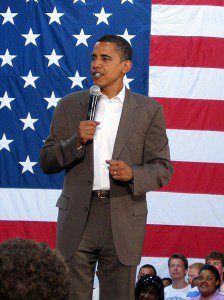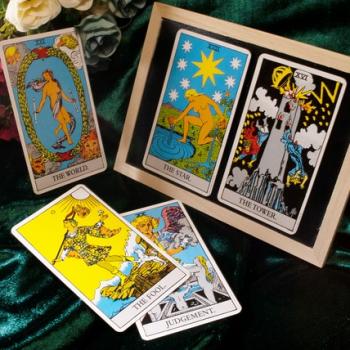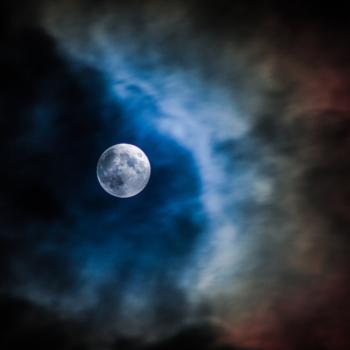
Mentions of the Christian God have been used in one form or another in nearly every State of the Union Address. Most of our Presidents have kept religious demagoguery relatively low, usually asking for a blessing of some kind in their closing statement, or declaring America to be blessed or chosen in some degree. In one form or another over the last 30 years, the President of the United States has signed off with a request for a blessing from the Christian God, which in and of itself is not such a terrible thing. It’s just a hunch, but I’m pretty sure they’re all Christians, despite what some would argue. It’s when discussion of religion strays beyond a simple blessing that the water gets murkier, closer to a jeremiad at times than a Constitutionally mandated report. Discussion has slowly migrated from a very general “Divine Providence” (George Washington, 1792, and James Madison 1810) to Theodore Roosevelt’s declaration in 1901 that “We need every honest and efficient immigrant […] to bring up his children as law-abiding and God-fearing members of the community.” However, when seeking to establish a connection with an audience as religiously diverse as it is ethnically diverse, an audience like the American people, the American President should seek unity, not division. America is a multifaceted Nation, but we are still one Nation, evidenced by our national motto, E Pluribus Unum (out of many, one). There is no need to subjugate and divide us by declaring that we stand united under a single god.
Speaking as an admittedly privileged white male, I’m uncomfortably aware of the rhetoric of exclusion, having benefited from it directly. A prime example is the sexism inherent in the current American lexicon. Pervasive uses of “man”-kind instead of “human”-kind are a prime example of archaic, male-dominated descriptors that should be phased out posthaste. We, as Pagans, have made great strides in equality, from the use of the pentacle on gravestones for our veterans to the Air Force Academy pagan circle. We still have a long way to go, however. I acknowledge that the Abrahamic faiths enjoy a spot at the top of the religious distribution pile in America, but by not acknowledging, even in passing, that other faiths exist, these other faiths are excluded.
During President Obama’s obligatory inclusiveness statement when mentioning the military last year, he said, “Our troops come from every corner of this country – they are black, white, Latino, Asian and Native American. They are Christian and Hindu, Jewish and Muslim.” This is an attempt to outline the inherent diversity of the US Military: mention race first, religion second. (Side note: There are literally hundreds of Native American tribes, but that only counts as one race?) Out of the dozen faiths and non-faiths found in the most recent US Census, only four rate a mention? This is a lead-in to a Don’t Ask, Don’t Tell Repeal statement, which is why the religious list starts off with Christians, something most of his audience can latch on to for familiarity. Then he throws a curve ball: Hindu. Hinduism is a curious choice for a society that counts only 0.25%, according to the 2008 US Census. It’s curious because in that same Census, the “no religion” demographic (Atheist, Agnostic, Humanist, No Religion) counted for 14.97%. (Perhaps the President would have been more accurate to say “They are Christian…and not.”) Then we’re given the follow-through, Jewish and Muslim (which account for 1.76% combined). Ah, back to familiarity. This one-two punch uses religious familiarity to settle, then confuse, then settle the listener so the pro-gay statement that follows is lost in trying to sort out the confusion of this religious list.
Other recent Presidents were much more comfortable with Christian language in their State of the Union Addresses, to the point where implicit exclusion became almost blatant. Reagan spoke repeatedly about Christian religion in the classroom; advocating for it in six of his seven addresses, saying in 1986 that, “…we must give back to our children their lost right to acknowledge God in their classrooms.” Clinton declared in 2000, “…we will become at last what our founders pledged us to be so long ago — one nation, under God, indivisible, with liberty and justice for all.” A historical note: the pledge was written in 1892, formally adopted in 1942, and the phrase “under God” was added in 1954 to further differentiate true-blooded Americans from the “godless Commies”. George W Bush stated in 2003 that, “The liberty we prize is not America’s gift to the world, it is God’s gift to humanity.”
So President Obama probably didn’t think he was out of line in his most recent State of the Union Address when he uttered the words, “We will stand for the rights and dignity of all human beings—men and women; Christians, Muslims, and Jews.” While the Abrahamic faiths and their many varieties have enjoyed an overwhelming majority in this country for its entire lifespan, I don’t believe that it gives them the right to rhetorically exclude those who don’t share their beliefs.
It’s not even that hard to be inclusive. Last year, President Obama stated, “We believe that in a country where every race and faith and point of view can be found, we are still bound together as one people […]” The language of inclusion is so simple to use. Point out how diverse we are by acknowledging that the number of faiths in this nation is innumerable, or would take too long to list. It would be better, even, to celebrate those facts, instead of simply acknowledging them.
Americans as a whole are getting fed up with the majority religious privilege that is so prominent in all levels of government. According to a recent survey by LifeWay Research, the research arm of the Southern Baptist Convention, only 16% of Americans felt more likely to vote for a candidate who routinely expressed religious viewpoints. It’s clear that despite the desperate outcries from some of the more fundamental religious institutions in our country, the US is inexorably moving toward a post-Christian society.
According to the 2012 Statistical Abstract done by the US Census Bureau, nearly 2.5 million individuals listed Wiccan, Pagan, Spiritualist, or Other on their religious affiliation in the latest census. That’s a huge leap versus 1990, where they numbered fewer than one million. We are still a minority and a miniscule percentage of the US population (0.94%), but if we don’t speak up now we’ll doom ourselves to perpetually being the “other”: the throw-away statement, included only when reciting historical phrases about inclusiveness, or simply by accident, never on purpose. I’m sure Presidents are not doing this out of malice, or even consciously. It’s the blindness inherent in being part of a privileged majority. Society is beginning to awaken to the gender-bias inherent in its phrases and word choice, and is making strides toward a more inclusive and respectful lexicon. Is it too much to ask that religious minorities receive the same courtesy?
Future Presidents need to embrace the true power in the sentiment paraphrased from the Declaration of Independence that “all are created equal,”: in actions, beliefs, and most especially words.

















